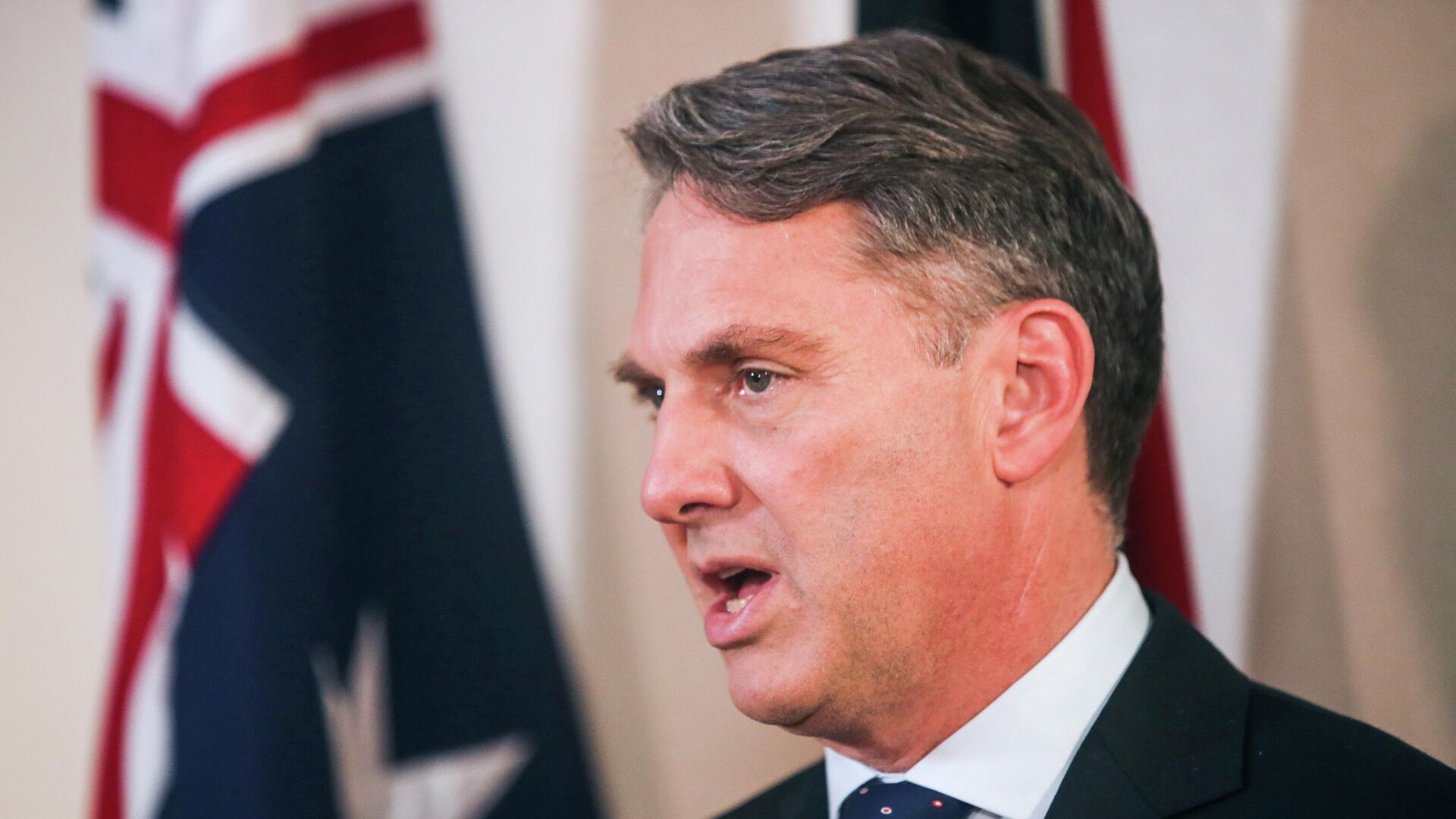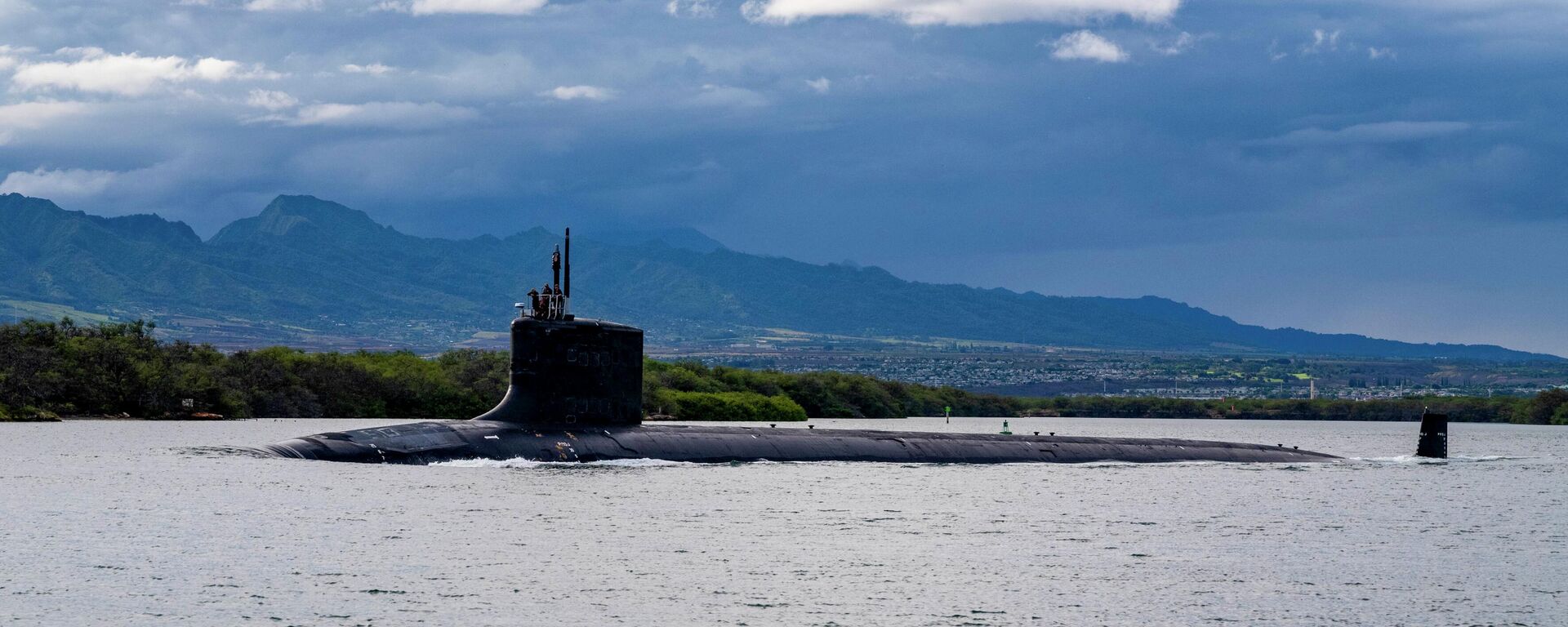https://sputnikglobe.com/20220704/australian-defence-minister-claims-china-seeks-to-shape-the-world-in-south-china-sea-1096920687.html
Australian Defence Minister Claims China Seeks to 'Shape the World' in South China Sea
Australian Defence Minister Claims China Seeks to 'Shape the World' in South China Sea
Sputnik International
In September, Canberra became a part of the joint AUKUS security agreement - alongside the UK and the US - as part of a larger effort to provide the Australian... 04.07.2022, Sputnik International
2022-07-04T01:50+0000
2022-07-04T01:50+0000
2022-07-04T01:47+0000
australia
aukus
china
asia
anthony albanese
south china sea
south china sea dispute
https://cdn1.img.sputnikglobe.com/img/07e6/07/04/1096921509_0:0:3072:1728_1920x0_80_0_0_0191132d8b0ea90c84b3befb31460bc3.jpg
Australia's Minister of Defence Richard Marles claimed that China is seeking sovereignty over the South China Sea, which is fundamentally at odds with how the UN Convention on the Law of the Sea is interpreted. And more to that, Australians should have the fortitude to defend their country.In a Sunday interview with Sky News Australia, Marles said that Beijing, and in particular its actions regarding the South China Sea, posed a direct threat to Australia as well as the "global rules-based order."Moreover, Marles argued that a third of the world's shipping flows through the area that Beijing wants to control, in addition to its plans for "unification with Taiwan," which has a seaside border to the east. According to the minister, the route was crucial for Australia because it allowed travel between the two of its top five trading partners, South Korea and Japan.Apart from the perceived threats, the defence minister also elaborated on his last month meeting with Chinese counterpart Wei Fenghe in Singapore, which reportedly ended the three-year impasse between the nations.Marles described the hourlong conversation between the two as "full and frank" and a "critical first step." "We talked about the incident which occurred to our aircraft on the 26th of May, we talked about human rights, we talked about strategic contest in the Pacific," the minister added.When asked if he could predict if China will change its course toward Taiwan, Marles replied that they "didn't get to that" during the talks. In order to improve the bilateral relationship between Australia and China, he remarked: "I think what we were really doing was starting with baby steps here and trying to get the bilateral Australian-Chinese bilateral relationship back to a better place." AUKUS Aftermath & Rising ChinaChina was a significant topic at the NATO Leaders' Summit in Madrid where Prime Minister Anthony Albanese participated. At the invitation of French President Emmanuel Macron, he also traveled to Paris and worked to mend ties after last year's fiasco over the AUKUS deal left an initial submarine deal with the French trashed.When asked if Albanese should apologize for the way the deal was handled, Macron reportedly said the two had patched things up, as the previous government of Scott Morrison was solely responsible for the damage.Meanwhile, at the NATO summit in Madrid in late last month, where Australia was invited as a strategic partner, China was called a danger to the alliance's ideals. Last week, the 30-member security bloc endorsed a new plan for the coming ten years, criticizing China for the first time in its more than 70-year history.
https://sputnikglobe.com/20220629/optimistic-in-the-extreme-australias-nuclear-submarines-under-aukus-unlikely-to-be-ready-by-2030-1096780586.html
australia
china
south china sea
Sputnik International
feedback@sputniknews.com
+74956456601
MIA „Rossiya Segodnya“
2022
News
en_EN
Sputnik International
feedback@sputniknews.com
+74956456601
MIA „Rossiya Segodnya“
Sputnik International
feedback@sputniknews.com
+74956456601
MIA „Rossiya Segodnya“
australia, aukus, china, anthony albanese, south china sea, south china sea dispute
australia, aukus, china, anthony albanese, south china sea, south china sea dispute
Australian Defence Minister Claims China Seeks to 'Shape the World' in South China Sea
Kirill Kurevlev
Managing Editor
In September, Canberra became a part of the joint AUKUS security agreement - alongside the UK and the US - as part of a larger effort to provide the Australian military with nuclear-powered submarines to confront China's increasing power in the Indo-Pacific. Beijing blasted the move, as did France after it lost an earlier deal with Australia.
Australia's Minister of Defence Richard Marles claimed that China is seeking sovereignty over the South China Sea, which is fundamentally at odds with how the UN Convention on the Law of the Sea is interpreted. And more to that, Australians should have the fortitude to defend their country.
In a Sunday
interview with Sky News Australia, Marles said that
Beijing, and in particular its actions regarding the South China Sea, posed a direct threat to Australia as well as the "global rules-based order."Moreover, Marles argued that a third of the world's shipping flows through the area that Beijing wants to control, in addition to its plans for "unification with Taiwan," which has a seaside border to the east.
"I think China is, seeking to shape the world around it in a way that we've not seen before and that does present challenges for us," he told the host. "It's important that in our relationship with China, we have the courage to articulate our national interests when that differs from Chinese action and we've been doing that and will continue to do that."
According to the minister, the route
was crucial for Australia because it allowed travel between the two of its top five trading partners, South Korea and Japan.
"It's important that we meet those challenges. We can't take any backward steps in relation to this," he added.
Apart from the perceived threats, the defence minister also elaborated on his last month meeting with Chinese counterpart Wei Fenghe in Singapore, which reportedly ended the three-year impasse between the nations.
Marles described the hourlong conversation between the two as "full and frank" and a "critical first step."
"It was a meeting that was much longer than I expected and to be honest, much more interactive than I expected and that's a good thing to be able to say," he said, adding that the two also spoke about a May incident involving a Chinese J-16 fighter jet interception of an Australian RAAF P-8A Poseidon aircraft that was reportedly conducting maritime surveillance.
"We talked about the incident which occurred to our aircraft on the 26th of May, we talked about human rights, we talked about strategic contest in the Pacific," the minister added.
When asked if he could predict if China will change its course toward Taiwan, Marles replied that they "didn't get to that" during the talks.
In order to improve the bilateral relationship between Australia and China, he remarked: "I think what we were really doing was starting with baby steps here and trying to get the bilateral Australian-Chinese bilateral relationship back to a better place."
AUKUS Aftermath & Rising China
China was a significant topic at the NATO Leaders' Summit in Madrid where Prime Minister Anthony Albanese participated. At the invitation of French President Emmanuel Macron, he also traveled to Paris and worked to mend ties after last year's fiasco over the AUKUS deal left an initial submarine deal with the French trashed.
When asked if Albanese should apologize for the way the deal was handled, Macron reportedly said the two
had patched things up, as the previous government of Scott Morrison was solely responsible for the damage.
Meanwhile, at the NATO summit in Madrid in late last month, where Australia was invited as a strategic partner, China was called a danger to the alliance's ideals. Last week, the 30-member security bloc endorsed a new plan for the coming ten years, criticizing China for the first time in its more than 70-year history.



